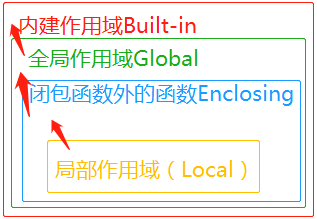不构成作用域
在 C 语言中, for 或者 if 是构成作用域的,在里面声明的变量是无法在外面使用的:
for (int i = 0; i < 3; i++) {
int a = i;
}
printf("i: %d, a: %d\n", i, a); // error
if (1) {
int a = 3;
}
printf("a: %d\n", a); // error但是在 python 中并没有这种规则,在 if/elif/else, for/while, try/except/finally/with 块都不构成作用域,所以你可以看到如下代码:
if True:
a = 3
print(a) # 3在 python 中,只有函数、类、模块(也就是文件)会形成新的作用域。
四种作用域
python 中有四种作用域:
- Local:当前函数的局部作用域。
- Enclosing:包含当前函数的外部函数的作用域(如果有嵌套函数)。
- Global:当前模块的全局作用域。
- Built-in:Python 内置的作用域。
查找时按从内往外的顺序查找:

示例如下:
g_count = 0 # Global
def outer():
o_count = 1 # Enclosing
def inner():
i_count = 2 # Localglobal/nonlocal
如果按照上面的规则,再配合“python 赋值时才声明”的语法特性,会发现一个有意思的“语义无能”现象:
global_value = 1
def write_global_value():
global_value = 2
def read_global_value():
print(global_value)
write_global_value()
read_global_value() # 为什么不是 2 而是 1这个如果写成 C ,那么显然应该打印 2 ,我们写了一个函数来更新全局变量,更新完了自然应该是 2 。就算是 python ,我并没有在 write_global_value 中声明 global_value 这个变量,它应该自动引用外部变量呀,在 read_global_vaule 中就很好得读出了全局变量的值呀?
这是因为当我们在函数中使用赋值语句 global_value = 2 时,其本质不是引用了全局变量,而是创造了一个新的局部变量,只是名字恰好和全局变量“撞车”了。
然后我们发现,当我们想用一个函数去写全局变量,就需要引入新的关键字了,他们就是 global/nonlocal ,分别用于引用全局变量,和引用 enclosing 变量。示例如下:
global_value = 1
def write_global_value():
global global_value
global_value = 2
def read_global_value():
print(global_value)
write_global_value()
read_global_value() # 2nonlocal:
def outer():
num = 10
def inner():
nonlocal num
num = 100
print(num)
inner()
print(num)
outer()